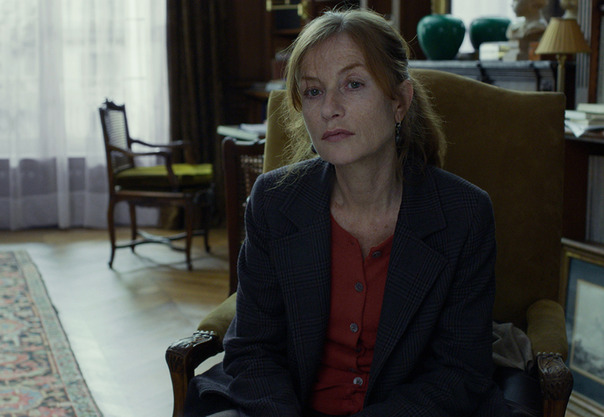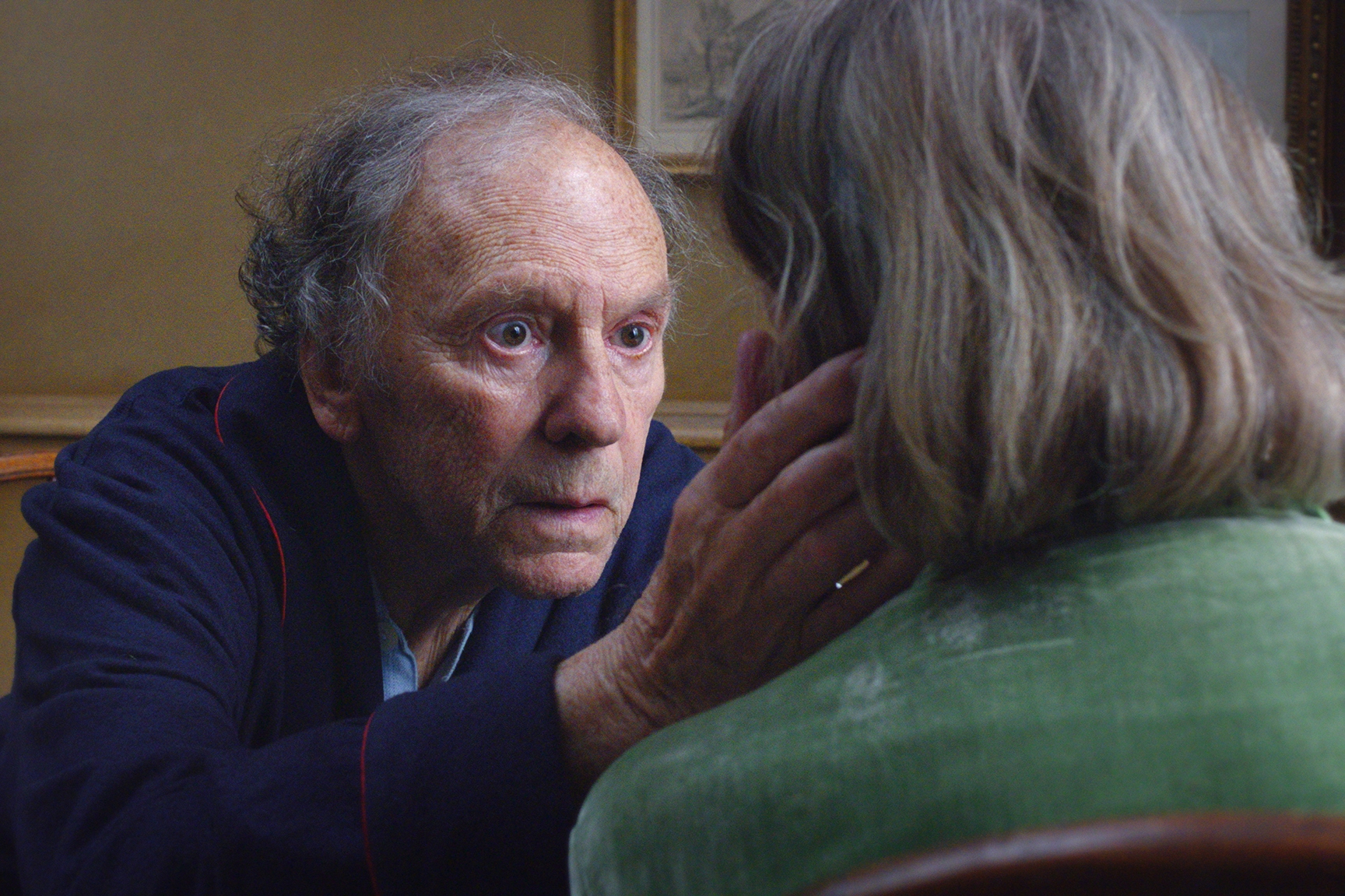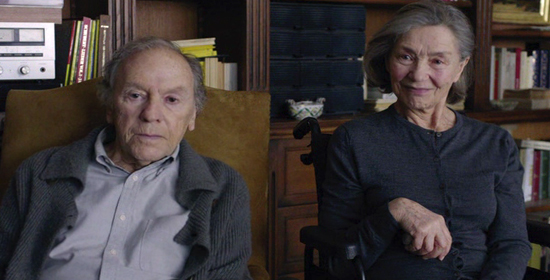Amour
Screenplay: Michael Haneke
Starring: Jean-Louis Trintignant, Emmanuelle Riva, Isabelle Huppert
Year: 2012
Language: French
UK rental release: March 2013
My awards awareness season has been fun so far, and it's been great trying to raise visibility on some great pictures that are usually ignored, even though awarding bodies are trying to recognise them in some shape or form. To tail off my themed pick of the weeks over the last month or so, it seemed only fitting to review the biggest success for world cinema throughout the last collection of awards festivals - Michael Haneke's Amour.
He came close to winning an Oscar when he received an Academy nomination 3 years previously for The White Ribbon (Palme d'Or winner in 2009), only to lose out to The Secret In Their Eyes (see my review of it here). He turned heads four years previous to that with the astonishingly good Hidden (Caché), of which I chose for one of my picks-of-the-week back in November last year. This time around, Haneke took his turn in the limelight with the emotional Amour winning all manner of gongs, including successes at the Academy Awards (Best Foreign Language Film), the César Awards (numerous, including Best Film), the Golden Globes (Best Foreign Language Film), the BAFTAs (numerous including Best Film not in the English language) and the coveted Palme d'Or at Cannes, to name but a few! So, what's the fuss all about...
We open on some fireman breaking into an apartment. Once in, they open some of the windows to release the smell they're confronted with. But not all were opened by them...in one untouched room, with a breeze entering of it's own accord lies the deceased body of an elderly lady, immaculately dressed and holding a bouquet of flowers.
We open on some fireman breaking into an apartment. Once in, they open some of the windows to release the smell they're confronted with. But not all were opened by them...in one untouched room, with a breeze entering of it's own accord lies the deceased body of an elderly lady, immaculately dressed and holding a bouquet of flowers.
We're taken straight to a theatre, facing the audience who are still trying to find their seats. Our leading couple are seated near the centre, chatting away happily. They're a couple who've become so comfortable with each other over time and still hopelessly in love with each other. Anne (Emmanuelle Riva, Three Colours: Blue, Hiroshima, mon amour) sits patiently nattering to her husband, awaiting a performance for her old piano pupil, Alexandre (real life pianist Alexandre Tharaud).
The next day, while at breakfast, Georges (Jean-Louis Trintignant, Three Colours: Red, The Conformist) takes his turn to chatter away. They still share mild banter and new stories together after many years in each other's company. Georges continues talking until he notices that something is wrong. Anne suddenly suffers from a mild stroke, as she stares blankly back at an aghast Georges. Minutes later, she snaps out of it, unawares - she doesn't want to believe that it has happened.
 Against her own views, she agrees to seek help. She undergoes an operation that isn't fully successful, so further strokes are likely. Now, they are always at the fear of further episodes occurring while Anne defies any more hospital visits. Hearing this disheartens her daughter, Eva (Isabelle Huppert, The Piano Teacher, Violette Nozière), who already feels distant from the situation, even with continuous calls to Georges to find out what's going on. Her presence troubles Anne, as she doesn't want her daughter to see her in the state she's in.
Against her own views, she agrees to seek help. She undergoes an operation that isn't fully successful, so further strokes are likely. Now, they are always at the fear of further episodes occurring while Anne defies any more hospital visits. Hearing this disheartens her daughter, Eva (Isabelle Huppert, The Piano Teacher, Violette Nozière), who already feels distant from the situation, even with continuous calls to Georges to find out what's going on. Her presence troubles Anne, as she doesn't want her daughter to see her in the state she's in. But Eva needs to help and she questions George's methods, even though they are at the behest of Anne's wishes to stay at home.
The key focus and direction of Amour's tale is of how this couple of many years of marriage deal with the aftermath of Anne's stroke. Behind this plot, however, are layers of emotions and perceptions delivered with such subtlety. A lot of this strength comes from Haneke's screenplay. With such great writing, the film is full of sweet and intelligent dialogue, delicately handled by our leading stars.
 This includes the calm and intense portrayal of Eva by Isabelle Huppert. In the few scenes she is in, Huppert is very moving as the couple's daughter. Feeling segregated and hopeless to help, she speaks from the mind of many children craving to aid their parents when in need; wanting to advise from their perspective without insulting the mothers and fathers they will always look up to. It's a difficult manner to put across, and Huppert does so effortlessly, thanks to her controlled delivery and the interesting chemistry between the characters of Eva and Georges.
This includes the calm and intense portrayal of Eva by Isabelle Huppert. In the few scenes she is in, Huppert is very moving as the couple's daughter. Feeling segregated and hopeless to help, she speaks from the mind of many children craving to aid their parents when in need; wanting to advise from their perspective without insulting the mothers and fathers they will always look up to. It's a difficult manner to put across, and Huppert does so effortlessly, thanks to her controlled delivery and the interesting chemistry between the characters of Eva and Georges. Turning to the father, there needs to be more discussion of Jean-Louis Trintignant as Georges. Emmanuelle Riva is sensational, deserving all her awards success, (including winning gongs at the BAFTAs & the Césars and a nomination at the Academy Awards) but so is Trintignant. He should have been recognised in the Academy Awards as well as others too in my opinion, but at least he picked up a César Award like Riva. He commands the whole picture from beginning to end, as Riva dances around his pillar of a performance with her emotive and beautiful execution of Anne. It's a wonderful partnership they have in the film as actors: lending extra gravitas and depth to the characters; breathing reality into the relationship in their portrayal of the elderly couple.
Turning to the father, there needs to be more discussion of Jean-Louis Trintignant as Georges. Emmanuelle Riva is sensational, deserving all her awards success, (including winning gongs at the BAFTAs & the Césars and a nomination at the Academy Awards) but so is Trintignant. He should have been recognised in the Academy Awards as well as others too in my opinion, but at least he picked up a César Award like Riva. He commands the whole picture from beginning to end, as Riva dances around his pillar of a performance with her emotive and beautiful execution of Anne. It's a wonderful partnership they have in the film as actors: lending extra gravitas and depth to the characters; breathing reality into the relationship in their portrayal of the elderly couple.Riva's performance is outstanding though. I'm a fan of Jennifer Lawrence, don't get me wrong, and she was bound to pick up at least one Oscar in her career, but Riva's portrayal of Anne was so worthy of the gong that it's a travesty that she didn't take it. With such a hard role to handle, it takes a lot of gumption to be able to play a woman going through Anne's strife. She is so affecting in the lead, and it's not a performance you'll forget in a hurry. At least Riva can be proud to say that she is now the oldest nominee in history up for Best Actress In A Leading Role at the age of 85.
Thankfully, as mentioned at the start of the article, Michael Haneke has finally received the plaudits he so deserves. As expected, he's as patient with his lens as he always is. For example, take the main leading shot in the theatre...Anne and Georges are only just noticeable in their seats as everyone else muffles around for their seats, then he stays on the audience to the receive their initial delight of the pianist's performance...it's true Haneke!
In fact, besides this scene and another brief sequence, the entire film is staged in the couple's apartment. It's a great set, acting as a supporting character to the leading pair. And with such a small environment to work in, it's surprising how much Haneke draws from it. He always calculates beautiful, drawn-out static shots for effect while at the same time allowing the actor's to exhale such natural performances, and he does so effortlessly here in a limited amount of shooting space, which is beyond admirable. You never feel claustrophobic either, and there are new angles to take in all the way up until the very end of the picture.
 And how do you feel by the end? It's a interesting journey, sure, and it has to be said that it contains some harrowing spells that some of you may find difficult to watch. Yet, the despair is united with some extremely moving moments, while still confidently hanging on to the looming melancholy that cannot be sidelined. Like the earnest scene where Georges tries to help Anne with her speech. It's sad but touching.
And how do you feel by the end? It's a interesting journey, sure, and it has to be said that it contains some harrowing spells that some of you may find difficult to watch. Yet, the despair is united with some extremely moving moments, while still confidently hanging on to the looming melancholy that cannot be sidelined. Like the earnest scene where Georges tries to help Anne with her speech. It's sad but touching.
 And how do you feel by the end? It's a interesting journey, sure, and it has to be said that it contains some harrowing spells that some of you may find difficult to watch. Yet, the despair is united with some extremely moving moments, while still confidently hanging on to the looming melancholy that cannot be sidelined. Like the earnest scene where Georges tries to help Anne with her speech. It's sad but touching.
And how do you feel by the end? It's a interesting journey, sure, and it has to be said that it contains some harrowing spells that some of you may find difficult to watch. Yet, the despair is united with some extremely moving moments, while still confidently hanging on to the looming melancholy that cannot be sidelined. Like the earnest scene where Georges tries to help Anne with her speech. It's sad but touching.
What Haneke has so eloquently managed is to build around this small world an affiliating tale that's both heart-warming and tragic, bringing up emotions from the deepest instincts of human nature, quality of life and the strength of true love. This is realised most purely in a brief moment when Anna is calling out in distress - the slightest of Georges' contact in gently stroking her hand eases her swiftly. It passes in a heartbeat, but still manages to highlight the picture's premise and is so naturally felt. I feel that these few seconds sum up Amour in it's entirety - no matter what the complication that may beset you, or the conflicts of views between you, it's the understanding that you are there for each other, through thick and thin, that carries more power and courage than any individual can burden alone.
The small awareness for Riva is one accomplishment in an awards culture usually geared towards the blockbuster realm, but it's Michael Haneke's steps to glory over the previous months that finally puts an extra flag for world cinema in the map of cinematic history. Showing all of his talent in Amour, it's just the right picture to attain such eminence and, in my view, the leader of the pack of my awards awareness season.
Don't forget to leave comments below, tweet me @filmbore or post on my Facebook page here.
Alternatively, you could contact me directly about this film or my other reviews on pickoftheweek@filmbore.co.uk








No comments:
Post a Comment